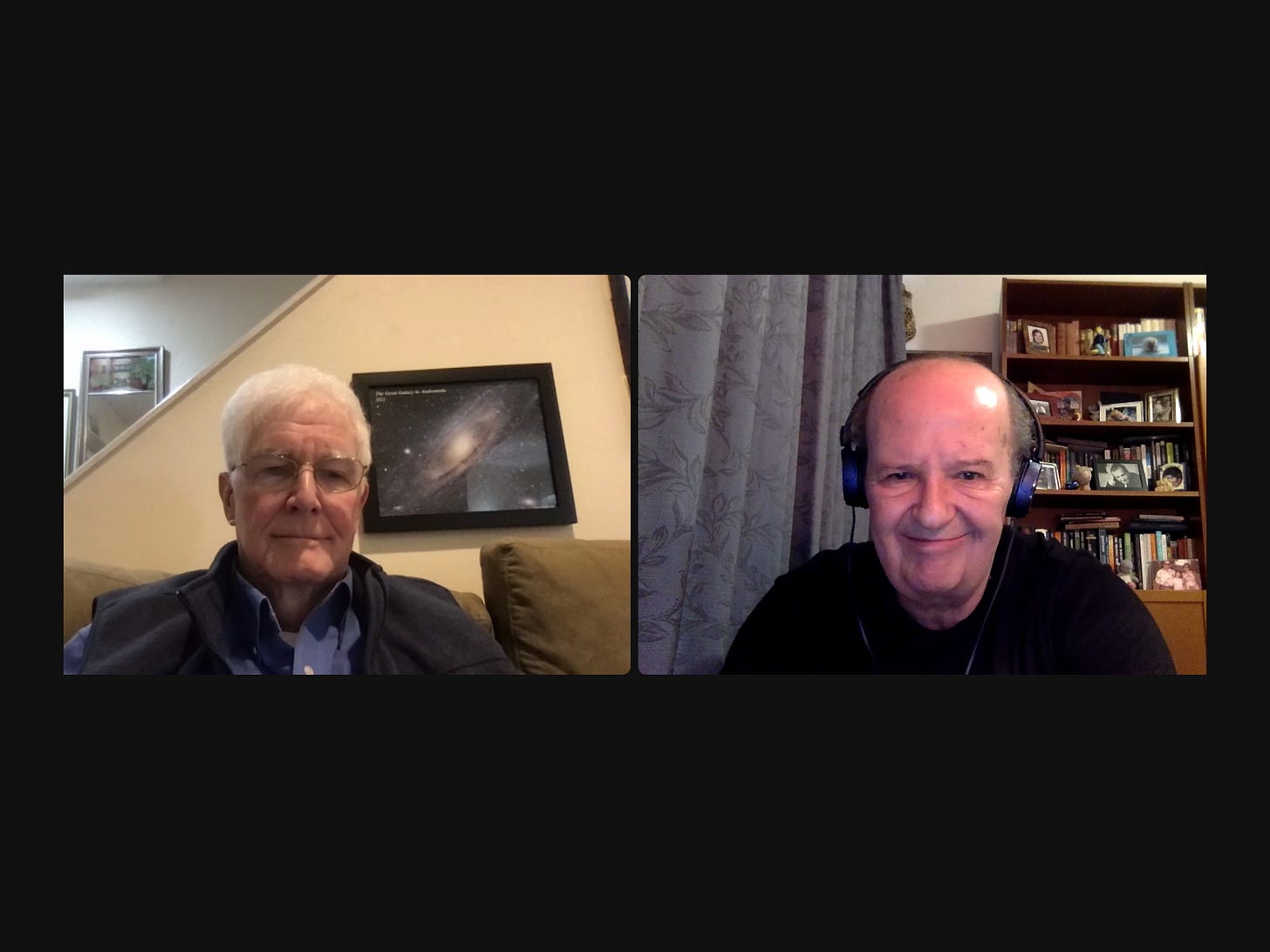This video is also on YouTube, and the audio-only version is in the Turing Church podcast.
Two weeks ago I participated in a webinar with Frank White, produced by the Moon Village Association (MVA). Frank coined the term “Overview Effect” to describe the powerful mind-changing and life-changing impact of seeing the Earth from space, and wrote a series of books starting with the seminal and very influential “The Overview Effect: Space Exploration and Human Evolution” (first published in 1987). See also “The Cosma Hypothesis: Implications of the Overview Effect” (2018).
The MVA webinar was centered on the Deep Space Effect, which is a cosmic version of the Overview Effect. Looking at the Earth from space, we feel one with the Earth. Looking at deep space, we feel one with the universe. Frank has used the term Universal Insight for more or less the same thing. In a previous webinar on the Deep Space Effect Frank said that he doesn’t know who coined the term Deep Space Effect. I heard it first from MVA’s President Giuseppe Reibaldi, who participated in both webinars.

Frank extends James Lovelock’s concept of Gaia, the living Earth, to the whole universe. The universe itself will become a living whole and we are “actively encouraged by larger forces” to expand beyond the Earth and “help the universe become increasingly self-aware.” A self-aware universe would be a universal Mind. So either we will create the universal Mind, or we will become “aware of, and part of” the universal Mind.
Whether this “complements or contradicts existing religious value systems depends largely on the interpretation of those systems by the people who have adopted them,” said Frank. “However, my interviews with astronauts of faith suggest that their religious perspective was strengthened, rather than being weakened.”
Frank notes that his cosmology has parallels with Yuval Harari’s “dataism,” described by Harari as the “most interesting emerging religion.” Dataism, as defined by Harari, “says that the universe consists of data flows, and the value of any phenomenon or entity is determined by its contribution to data processing.” This may sound kind of cold and metallic, but if life is an algorithm and self-awareness is data processing the parallels with Frank’s ideas are evident.
At the MVA webinar there wasn’t time to address all the points I wanted to discuss with Frank. So I had this new conversation with him. Please find below my comments and questions (all related to space philosophy, cosmic metaphysics, and religion), and listen to hear Frank’s thoughtful replies and other points that came up.
Let me start with my own interpretation of your ideas.
To me, the feeling of unity with the universe that you describe embraces the whole of space and time, including the future. Looking at the majestic galaxies out there, I feel close to future humans living among the stars and contributing to cosmic evolution.
Looking at deep space I feel part of our cosmic destiny. We are indeed, as you say, actively encouraged by larger forces to expand into the universe out there and play an important cosmic role among the stars. The Universal Insight is part of my personal religion, and I seek the powerful feeling of unity with the universe that we have been calling the Deep Space Effect.
Our duty to God, or to God by any other name, or to the cosmos, or to some cosmic principle that favors life, or to life itself, is to expand beyond the Earth into the black sky and support cosmic evolution.
Frank, in your books you come across as a believer. Do you participate in an organized religion? What is your concept of divinity?
Do you think the Universal Insight could be incorporated into the value systems of the world’s traditional religions? Could the integration of the Universal Insight into the world’s traditional religions help humanity go to the stars and support cosmic evolution? Should this integration happen? And how can we make it happen?
Or alternatively, should new religions centered on the Universal Insight appear and gradually replace traditional religions, with new rituals centered on the Deep Space Effect? Which one of these two scenarios would you prefer?
Could you elaborate on the parallels and differences between your ideas and the emerging religion that Yuval Harari calls “Dataism” in his book “Homo Deus” (2016)?
You don’t rule out the possibility of God-like agents that created the universe from outside, like in traditional Western religions or simulation cosmologies, but you focus on a self-aware universal Mind that emerges from inside the universe. Would this Mind be a “personal” Mind with a sense of personal identity, goals, feelings, hopes, fears…?
Do you think the universal Mind is already self-aware, perhaps as a result of the help of alien civilizations that evolved before us, or that we are expected to assist the self-awareness of the universal Mind to emerge? How could we assist a universal Mind that already exists as a self-aware being?
The possibility that “the universe has a sentience beyond our own and does care in some way” (I’m quoting from “The Cosma Hypothesis”) is a bridge that could connect your cosmology to traditional religions. Can believers in traditional religions consistently identify the universal Mind with the God (or Gods) of their religion?
You don’t speculate on the physical nature of universal sentience. But there are speculative physical theories around that suggest the very fabric of space-time is like a neural network that learns and thinks. Does this idea make sense to you?
And since tomorrow is Easter, does your cosmology include concepts of personal resurrection and afterlife for us?



